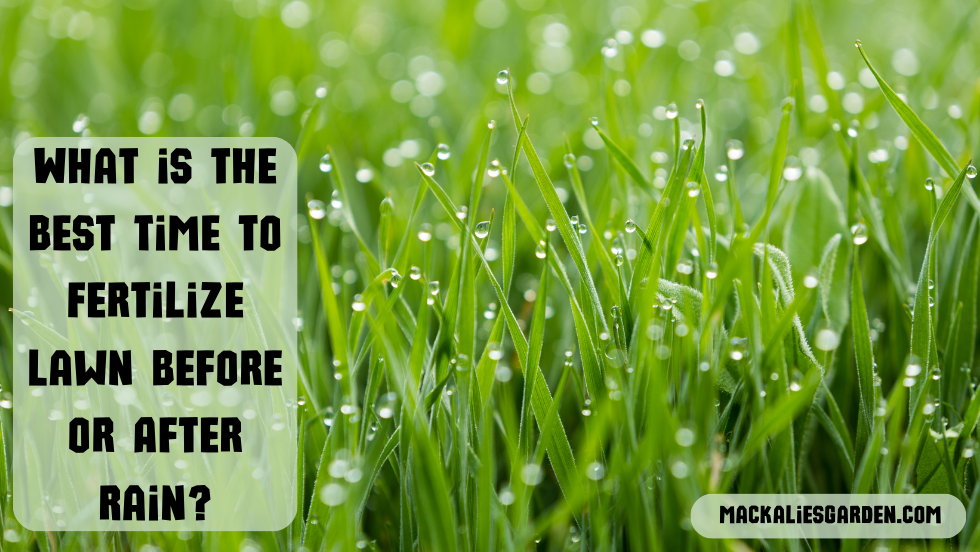As a gardening expert, I understand the importance of timing when fertilizing your lawn. Proper fertilization will help your property grow healthy and green throughout the year.
But is it reasonable to fertilize after it rains? The answer is not relatively as straightforward as you may think. While the rain can wash away some of the nutrients that come with fertilizers, it depends on the type of fertilizer and when you apply it, so read on to learn more about this essential part of lawn care.
In this guide, we’ll cover the ideal fertilization time, how rain influences the process and the most practical methods for lawn fertilization.
Ideal Time for Lawn Fertilization
Knowing when to fertilize your lawn is important for optimal growth and health. Here are some factors to consider:
- Time of the year: The best time to fertilize your lawn will depend on your grass type. Cool-season grasses (e.g., Kentucky bluegrass, ryegrass, and fescue) should be fertilized in the spring and fall, while warm-season grasses (e.g., Bermuda, Zoysia, and St. Augustine) benefit from fertilization in late spring to early summer.
- Weather conditions: Fertilizing your lawn when moderate temperatures (between 60-70°F) ensures optimal nutrient uptake. Also, avoid fertilizing during drought or extreme heat, which can stress the grass.
- Condition of the lawn: Observe your yard for signs that it may need fertilization, such as weak growth, pale color, or increased weed growth. When these signs appear, it’s time to fertilize.
Rain and Lawn Fertilization
Since rain can significantly impact lawn fertilization effectiveness, choosing the right time to apply fertilizer is crucial. Let’s dive into the pros and cons of fertilizing before or after rain.
Best time to Fertilize Lawn Before or After a Rain
Fertilizing your lawn before or after heavy rainfall should be avoided, as the fertilizer can not only be lost through leaching but also might be washed away without ever reaching the root zone. For its best effect, it is recommended to fertilize before light to moderate rainfall; this way, roots will have plenty of time to benefit from the nutrients released as the fertilizer breaks down. However, there are some pros and cons about before and after rain which are as follows:
Fertilizing Before Rain
Pros
- Water is necessary for the fertilizer to be absorbed into the soil, so applying it before rain allows nature to water your lawn.
- Rain helps dissolve and spread the fertilizer, ensuring even coverage and absorption.
Cons
- Heavy rain can result in washed-away fertilizer, which is both wasteful and harmful to the environment. Aim for light to moderate rain in the forecast.
- Poor timing or unexpected weather changes can cause the fertilizer to become ineffective if rainfall is insufficient or delayed.
Fertilizing After Rain
Pros
- Fertilizing after rain ensures the soil is already moist, allowing for better nutrient uptake.
- Rain may have already loosened the soil, making it easier for nutrients to penetrate and be absorbed by the grass’s roots.
Cons
- If the ground is too saturated, the fertilizer may not be adequately absorbed and runoff, causing pollution and uneven application.
- Fertilizing when the lawn is still wet can cause clumping, resulting in inconsistent coverage.
Practical Fertilization Methods
To ensure your lawn grows healthy and green, follow these practical fertilization methods:
- Choose appropriate fertilizer: Use a high-quality, slow-release fertilizer designed for your lawn type. This will provide a steady supply of nutrients without causing rapid growth or burning your grass.
- Follow recommended rates: Over-fertilizing can lead to lawn damage and environmental harm. Check the product label for the recommended application rate, and consider using a lawn spreader for even distribution.
- Monitor weather conditions: Monitor the weekly weather forecast and choose a day with light to moderate rain expected within 24-48 hours after your planned fertilization.
- Proper mowing and watering: Regular mowing and watering can promote vigorous root growth, which helps your lawn absorb nutrients.
Recommendations: Fertilize Before or After rain
- Assess your soil type, climate, and particular fertilizer. For sandy soils or dry climates, fertilizing before rain might be more beneficial.
- Consider the type of fertilizer you’re using: organic slow-release fertilizers might be better suited for application after rain, while synthetic fast-release fertilizers might benefit from rainwater to distribute the nutrients evenly.
- If fertilizing before the rain, monitor upcoming rainfall predictions and ensure it won’t be too heavy to cause leaching. A gentle rain is optimal.
- Always follow the label instructions on the fertilizer package; it can help minimize any adverse effects of rain on fertilizer application.
Related FAQs
What are common problems with fertilizers?
Common problems with fertilizers can include nutrient imbalance, leaching, burning of the grass, and algae blooms caused by nutrient runoff from improper application.
How often should I fertilize my lawn?
The frequency of fertilizer applications will depend on your grass type and soil fertility level. Generally, cool-season grasses should be fertilized twice a year (spring and fall), while warm-season grasses benefit from 3-4 applications throughout the growing season. Consult with your local gardening center to determine the best schedule for your lawn.
What is the best way to apply fertilizer?
The best way to apply fertilizer is to use a spreader evenly distributing it across your lawn’s surface. This ensures that the grass adequately absorbs the fertilizer and is not wasted. Additionally, use low-pressure settings on your spreader to prevent clumping of the fertilizer.
Lastly, ensure you follow the recommended application rate on the product label. Excess fertilizer can lead to lawn burn or environmental damage.
Conclusion:
We hope you got the answer to the query should you fertilize grass before or after rain? When it comes to fertilizing your lawn, timing is critical. Depending on the type of grass and weather conditions, you may choose to fertilize before or after rain. Always check the product label for application recommendations and use slow-release fertilizers for optimal results. Additionally, monitor upcoming rainfall predictions to avoid over-fertilizing or leaching. With the proper planning and preparation, your lawn will stay healthy and green all year round.

Douglas Mackalie is a Founder of Mackalies Garden. He is one of the most exciting people you’ll ever meet. He has 25 years of experience in horticulture and gardening, most of which he’s spent outdoors getting his hands dirty.

